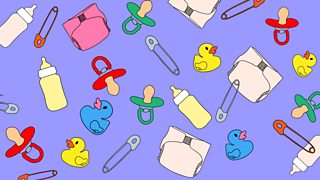Seven of the best parenting tips from 2019
Want to know how to discuss climate change with your children? Or how to achieve a stress-free family life? There were a whole range of topics covered in the ±«Óãtv Radio 4 Woman’s Hour parenting podcast and parenting articles this year. If you don’t have time to go back into the archives (a high probability if you’re a parent!), we’ve done the legwork for you. Here are seven of the best tips that were dished out by experts and guests on the programme in 2019...

1. Do some form of physical activity as a family to tackle stress
A stress-free family life might seem like an alien concept. But not to Dr Rangan Chatterjee, GP and author of The Stress Solution and Dr Genevieve von Lob, a clinical psychologist and author of Happy Parent, Happy Child. They shared lots of tips for reducing stress and anxiety in the family home with Woman’s Hour, including this piece of advice:
A simple thing to do is before dinner put on some loud music and just dance with your children.Dr Rangan Chatterjee
Dr Rangan Chatterjee said: "When you’re stressed, when you’re anxious, you’re priming your body for physical activity, yet in the modern world we’re often sat on our bums not doing anything about it. A simple thing to do is before dinner put on some loud music and just dance with your children. That’s what I do with my children before dinner. You can do some body weight exercises together or you can do play fighting.
“The point is physical activity helps lower stress levels, and if you do it together, you engage relationships and it’s much more likely that you continue it long term."
Read more advice about achieving a stress-free family life here.
2. Don’t isolate yourself if you’re a freelancing parent
A freelance life can suit many parents. There’s potentially more flexibility for childcare, the possibility of choosing work that interests you and sometimes the option of working from home. But there can also be worries of an uncertain salary, feeling like you’re constantly on-call or feeling isolated.
Woman’s Hour spoke to Annie Ridout, author of the Freelance Mum and Corinne Stuart, head of sales at IPSE, to hear how you can get the best out of work and your home life when you’re a freelancing parent.
Here’s one of Annie Ridout’s tips: “[Freelancing] can feel quite lonely sometimes, especially if you’re working from home. A trend which is emerging...is for freelance parents to meet up at one person’s house and to hire a babysitter to look after all the children, so that everyone else can work together around the kitchen table, or wherever works. It’s a way to keep conversations going and to network while you’re working.”
Discover more tips for freelancing parents here.

3. All parents should set boundaries
Psychotherapist Philippa Perry shared her advice for parenting with Woman’s Hour, following the release of her latest publication, The Book You Wish Your Parents Had Read. She had lots of tips for parenting well and giving children a healthy start – while not being too hard on yourself. Setting boundaries with your children was one of them.
How do you put down boundaries in a loving way? The answer is ‘I’ statements, not ‘you’ statements.Philippa Perry
Philippa Perry: “It’s really difficult because you love your kid and you want to give them everything, but there comes a time when you reach a limit. So whatever your parenting strategies, you’ll need boundaries. Even if you think you’re the most facilitating parent in the world, you’ll still need boundaries.
“How do you put down boundaries in a loving way? The answer is ‘I’ statements, not ‘you’ statements. You define yourself and not the child. So that means, ‘I know you want to take the night bus across town, but I’m not ready to let you do that yet.’ It doesn’t mean: ‘No you’re 13, you’re far too young’.
“Nobody likes to hear themselves defined, so define yourself and not the child.”
Read more of Philippa Perry’s tips about parenting here.
4. Speak about gender stereotypes
Woman’s Hour recently discussed how to raise boys to be good men, who are respectful of women and believe girls should have the same rights and opportunities as they do. Consultant clinical psychologist Emma Citron, journalist Victoria Richards and Jordan Jones, volunteer at the Good Lad Initiative, shared their advice, including making sure you speak about gender stereotypes with your children.
“Chipping away at stereotypes from a young age is important,” according to Emma Citron. “If any stereotypes or prejudices leak out, for example ‘boys are stronger than girls, and they climb the climbing frame and are so good at everything’, you can start to present other points of view. ‘You may not be noticing that girls are doing X or Y’ or ‘actually they are very good at maths’.”
For Jordan Jones, every moment is a learning opportunity for his two children, from watching a Disney movie to taking a bus together. He recently taught his daughter about mansplaining: “I said to her, ‘it’s quite interesting that that man interrupted that woman when she was speaking, and then said exactly what she was going to say’. And she’ll say in her eight-year-old brain, ‘yeah, actually that is quite weird that he’s just explaining it again, he didn’t have to explain it’. So now she has the [understanding] without me forcing it on her.” He says he’ll use the same approach with his son too as he grows older.
Find out more about the Woman’s Hour discussion on how to raise boys to be good men.

5. Talk to your children about climate change but give them choices
As children and young people become more and more engaged with environmental issues, how can parents support them and talk to them about climate change in an age-appropriate way? Woman’s Hour put the question to climate change psychotherapist Caroline Hickman, climate change teacher Fiona Cowan and 19-year old eco-activist Ella Mann - who organised a climate strike in Oxford - on an episode of the Woman's Hour parenting podcast in 2019.
It’s never too early to start talking about diversity and bringing diverse books into children's lives.Dr Pragya Agarwal
Here's one of the pieces of advice Caroline Hickman shared: “We need to make the conversation [about climate change] fit the child in front of us – so judge their age and capacity to understand, then start the conversation by asking them how they would like to discuss it. Give choices, use some books, watch the David Attenborough documentaries together – but then discuss it together.”
Read more about how to talk to children and young people about climate change here.
6. Don’t shy away from conversations about race
Parenting comes with plenty of awkward conversations, from discussing sex to bodily functions, but race and racism can be one of the more sensitive areas to navigate. Woman’s Hour discussed how to talk about race and racism with your children with entrepreneur, blogger and mum-of-one Freddie Harrel and behavioural scientist and diversity consultant Dr Pragya Agarwal, who has three daughters.
They advised that you should start the conversations early on. “It’s never too early to start talking about diversity and bringing diverse books into children's lives,” according to Dr Pragya Agarwal. “Make talking about skin colour normal and encourage respectful curiosity. Never shush them or show that talking about someone's skin colour is awkward or embarrassing.”
“People will say, ‘oh my children are too young to talk about race’,” Freddie Harrel said. “But if you’re having constant conversations about Brexit around them, if they can hear that then they can hear more.”
Read more about how to talk about race and racism with your children here.

7. Rice cakes can save the day
Finally, Woman’s Hour asked five mums about the things they had learnt in the year since their children were born for the Bump, Birth and Beyond series. There were some absolute gems: “Don’t ever, under any circumstances, go out of the house without a packet of rice cakes,” warned Jen Barratt. “Rice cakes are like the only way you can get through a meal in a restaurant or a pub. They’re the best.”
Find out more about the Woman’s Hour Bump, Birth and Beyond series here.



